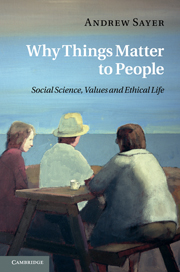Book contents
- Frontmatter
- Contents
- Acknowledgements
- 1 Introduction: a relation to the world of concern
- 2 Values within reason
- 3 Reason beyond rationality: values and practical reason
- 4 Beings for whom things matter
- 5 Understanding the ethical dimension of life
- 6 Dignity
- 7 Critical social science and its rationales
- 8 Implications for social science
- Appendix: Comments on philosophical theories of ethics
- References
- Index
1 - Introduction: a relation to the world of concern
Published online by Cambridge University Press: 05 June 2012
- Frontmatter
- Contents
- Acknowledgements
- 1 Introduction: a relation to the world of concern
- 2 Values within reason
- 3 Reason beyond rationality: values and practical reason
- 4 Beings for whom things matter
- 5 Understanding the ethical dimension of life
- 6 Dignity
- 7 Critical social science and its rationales
- 8 Implications for social science
- Appendix: Comments on philosophical theories of ethics
- References
- Index
Summary
This book is about social science's difficulties in acknowledging that people's relation to the world is one of concern. When we ask a friend how they are, they might reply in any number of ways; for example:
‘I'm OK, thanks: my daughter's enjoying school, things are good at home and we've just had a great holiday.’
‘Not so good: the boss is always in a bad mood and I'm worried about losing my job.’
‘OK myself but I'm really appalled by what's been happening in the war.’
‘I'm a bit depressed: I don't know where my life is going.’
Such responses indicate that things matter to people, and make a difference to ‘how they are’. Their lives can go well or badly, and their sense of well-being depends at least in part on how these other things that they care about – significant others, practices, objects, political causes – are faring, and on how others are treating them. In some respects the answers are very subjective and personal, yet they are not just free-floating ‘values’ or expressions projected onto the world but feelings about various events and circumstances that aren't merely subjective. They reflect the fact that we are social beings – dependent on others and necessarily involved in social practices. They also remind us that we are sentient, evaluative beings: we don't just think and interact but evaluate things, including the past and the future (Archer, 2000a).
Information
- Type
- Chapter
- Information
- Why Things Matter to PeopleSocial Science, Values and Ethical Life, pp. 1 - 22Publisher: Cambridge University PressPrint publication year: 2011
